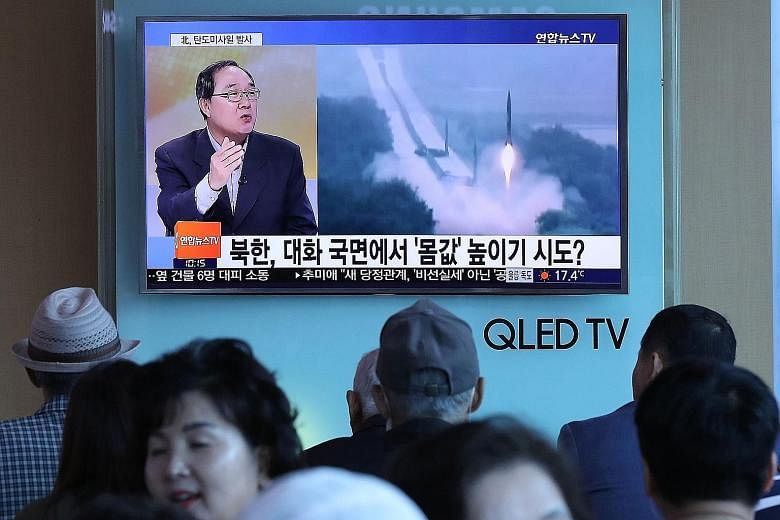North Korea fired a ballistic missile just days after South Koreans elected a new liberal leader deemed friendlier to Pyongyang, in what analysts said is a test of President Moon Jae In's resolve and a sign that the regime will continue its nuclear programme.
Launched near north-western Kusong city at 5.27am (4.27am Singapore time) yesterday, the missile flew 700km for about 30 minutes and hit an altitude of 2,000km - the highest recorded for a missile from the North - before landing in waters between North Korea and Japan.
The provocation, which came as a North Korean delegation met its South Korean counterparts at the Belt and Road Forum in Beijing, drew condemnation from South Korea, Japan and the US, while China and Russia expressed concern.
Mr Moon, who took office last Wednesday, called the missile test a grave threat to regional security and urged Pyongyang to reverse its course. While the doors to dialogue are open, he stressed that "it is only possible if North Korea changes its attitude", said his spokesman.
Japanese Prime Minister Shinzo Abe said the provocation was "totally unacceptable" and a violation of United Nations resolutions.
US Ambassador to the UN Nikki Haley told broadcaster ABC yesterday that North Korea's latest ballistic missile launch stems from leader Kim Jong Un's "state of paranoia" following South Korea's recent election. She added that the launch was "getting close to home" for Russia.
The White House had noted earlier that the missile fell closer to Russia than Japan, and US President Donald Trump "cannot imagine that Russia is pleased".
Observers said this is a sign that the US is urging Russia to do more to restrain Pyongyang, especially after Russian President Vladimir Putin promised Mr Moon in a phone call last Friday that Russia would play a "constructive role" in ending the North's nuclear programme.
Mr Putin also discussed the Korean situation when he met Chinese President Xi Jinping on the sidelines of the Beijing forum yesterday. Both "expressed their concern over the escalation of tensions", said a Kremlin spokesman.
Mr Xi was quoted by the Xinhua news agency as saying China and Russia "have been committed to seeking a political solution" to the Syrian conflict and the Korean nuclear issue, and playing a key role in safeguarding peace and stability.
Dr Bong Young Shik of Yonsei University's Institute for North Korean Studies said it makes "strategic sense" for Washington to "remind Russia of this grave danger" in the region. This will also increase pressure on North Korea, he added.
However, Dr James Kim from The Asan Institute for Policy Studies think-tank in Seoul said it remains to be seen if the move will be effective, as Russia tends to align itself with China and follow Beijing's lead on North Korean issues.
In a statement yesterday, China's Foreign Ministry urged all parties to "exercise restraint".
Even if Beijing is upset with Pyongyang's perceived attempt to upstage the Belt and Road Forum, experts said, there is not much Beijing can do. China is already enforcing an import ban on coal, North Korea's most important export.
Dr Bong said Beijing will be annoyed, but the latest provocation is "not such a grave game-changer that it will make Beijing reset its strategy" against Pyongyang.
He said North Korea is so "single-minded" in its pursuit of an inter-continental ballistic missile (ICBM) capable of striking the US, that it will conduct missile and nuclear tests until it achieves its goal.
The US Pacific Command said yesterday's missile did not appear to be an ICBM. But US scientist David Wright of the Global Security Programme at the Union of Concerned Scientists has warned in a blog that the latest missile could reach as far as 4,500km if fired normally, and not at a high angle like yesterday.
This means the missile, which Dr Wright said could be the new one Pyongyang unveiled at a military parade last month, can hit Guam, a US territory 3,400km from the North.
Dr Kim said North Korea's continued provocations will make it harder for Mr Moon to push for dialogue. "North Korea needs to be cooperative for him to engage, but this shows North Korea isn't willing to play that game."
WATCH THE VIDEO
North Korea launching a ballistic missile from a test facility near its west coast. http://str.sg/46Bk


